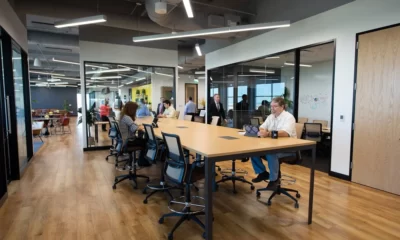App
How To Build An App Like Uber – Step-by-Step Guide

You probably have a few on-demand transportation apps on your phone right now, which shows how popular (or in-demand!) these programs are. In an effort to challenge the established major players in the industry, more companies are starting to offer on-demand services. With the impact of Airbnb on hotels or Uber on the traditional cab market, we have previously witnessed such successful efforts. You can use custom mobile application development services for better results.
The idea behind Uber-like apps is to make it easier for you to request a trip by automatically determining your location. The app then matches your requests with the nearest driver who is available. You can rate the ride after you’ve completed the journey and pay for it.
In a nutshell, these statistics show a change in how people are commuting to different locations. In urban cities, open spaces are still being consumed by the growing population. In order to travel conveniently, more and more car owners are turning to on-demand taxi services as traffic conditions get worse and parking spots fill up quickly. It’s fair to say that the future of the ride-hailing industry looks bright and promising in light of this scenario.
Whatever your reason, here we want to give you a step-by-step tutorial on creating such an application in the hopes that it will be helpful.
Table of Contents
Research & Technical Audit
Making a list of the specifications for the development of your Uber-like app is the first step. You only need to create an app that matches your current operations if you already offer a taxi booking service. However, if you are starting from scratch, then every step needs to be planned according to your vision. Business owners should seize both opportunities to conduct research and determine how they could outperform current taxi booking apps. Make sure to prefer custom mobile application development services to access quality and beneficial results.
Establish Your Alternative Uber App’s Target Markets
It makes sense to conduct several background checks before beginning the app development process. A good time to learn more about your potential customers and plan the overall course of the app development process is when you’re attempting to create an app similar to Uber.
You should decide precisely which market you intend to target before you begin any project-related preparation. Picking a country first is what I’d advise doing first. As a result of their diverse economies, various nations have different transportation needs.
Do Some Research And Choose A Business Model For Your Ride-sharing App
You must complete this step by creating the user personas, scenarios, and flows as well as the business model and value proposition canvases. Founders who contact us occasionally think it’s a waste of time, but our experience demonstrates that companies that choose to participate in thorough product workshops have a much better understanding of the business model, the steps necessary to successfully complete the project, and the factors that will ultimately produce a competitive product.
User stories, which are essentially a more thorough description of every feature you intend to include in your application, are a crucial component of the research as well. It’s not a necessary component because you can just use a list of features, but taking this step now could benefit you later on, like when you need to estimate how long and how much it will cost to develop an app.
As part of our product design services, you must take care of all of these elements.
Application Guides
You will have selected the type of apps—native or hybrid—as well as the platforms—iOS and Android—for which they will be developed—before moving on to app documentation. These are extremely important questions because they dictate the precise path that app development will take. The next step entails compiling a list of the app’s technical requirements, including its architecture and tech stack, after these queries have been resolved and the requirements have been finalized.
Creation Of An MVP For A Ridesharing Service
After the study is complete, it is time to be ready for development. Of course, you don’t want to create a comprehensive enterprise application from scratch. Building an MVP should be sufficient to introduce a usable product to the market without expending excessive time and resources. You want to begin development incrementally. For increasing your return on investment throughout the early stages of development, use this tried-and-true method.
Also, Check – What Skills Does an iOS Programmer Need?
Deployment of The App
An app is developed, then released into live environments where its functionality and performance are tested across a range of devices. To get the app ready for a market launch, any issues are quickly fixed.
The key phases of developing a taxi booking app are thus as follows. In order to put things into perspective, it’s important to understand how Uber, a cutting-edge on-demand ride-booking service, operates and how it has managed to completely upend the taxi industry.
Growth And Development Going Forward
There won’t be any time to pause and toast your accomplishments with a bottle of Crystal in the Maldives once you’ve created your MVP and obtained your first clients. Instead, you must continue on and essentially start the cycle over again.
We typically set up an MVP stage retrospective meeting for our clients to accomplish this. We record all the good and bad choices made throughout the meeting in order to be even more productive moving forward. We schedule a second product workshop and begin ideating for additional development after the retro. The cycle continues after we assign a priority to those ideas.
Preventing Fraud
One major issue that Uber and apps like it deal with is fraud. Such manoeuvres require a lot of work to identify and prevent. Only a select few people who have brilliant ideas for game-changing schemes are able to think them through. Uber can, for instance, pull altitude data and compare it with specific location data to determine if they have reason to believe someone is trying to game the system.
The Final Talk
It can be summed up as an on-demand service application that acts as a liaison between a service provider and an end user (for instance, a person looking to travel from point A to point B).
The majority of Uber-like services are mobile-first, which is very convenient and improves user experience. Just a few taps on your screen will send the service you requested on its way, and you can pay for it with your connected card (or other cashless payment methods like Google Pay or Apple Pay). The appeal of an on-demand service lies in this.
As you can see, a large number of on-demand apps are doing “alright.” You might be inspired to create one of your own if they are successful. You might also be looking to grow your company even further and realise that providing your own on-demand services has a lot of potentials.

-

 Business3 years ago
Business3 years agoThe Ultimate Guide To Thriving In Your Printing Franchise
-

 Business3 years ago
Business3 years agoExploring The Benefits And Challenges Of Restaurant Franchising
-

 Business4 years ago
Business4 years agoHow to Do Long-Distance Moves with Children
-

 Tech4 years ago
Tech4 years agoCyber Table That Will Change Your Life
-

 Lifestyle3 years ago
Lifestyle3 years agoDallas’ Hidden Gems: 6 Must-Try Restaurants Off The Beaten Path!
-

 Lifestyle3 years ago
Lifestyle3 years agoTop 10 Restaurant Franchises In The US
-

 Business5 years ago
Business5 years agoIs Guest Posting a Good Inbound Marketing Strategy?
-

 Business3 years ago
Business3 years agoTop 10 Reasons You Should Invest In A Coworking Franchise













Recent Comments